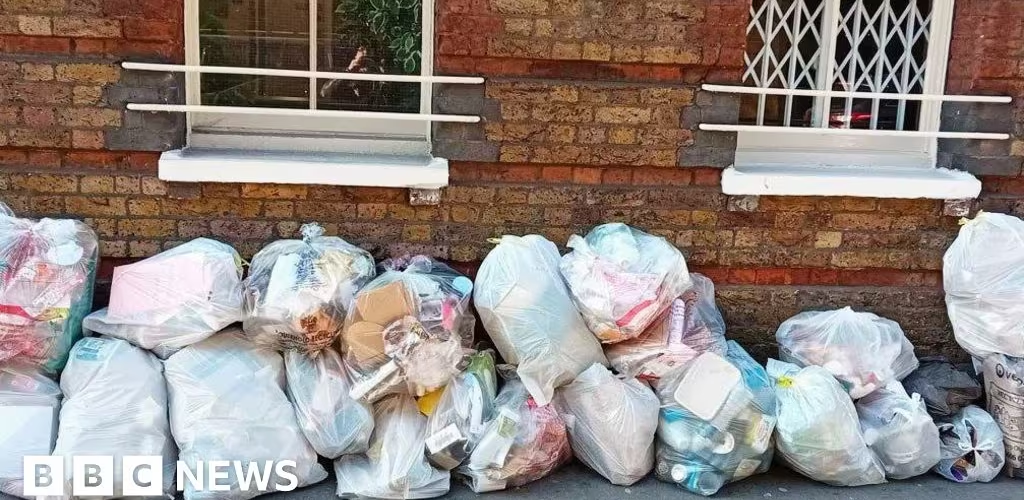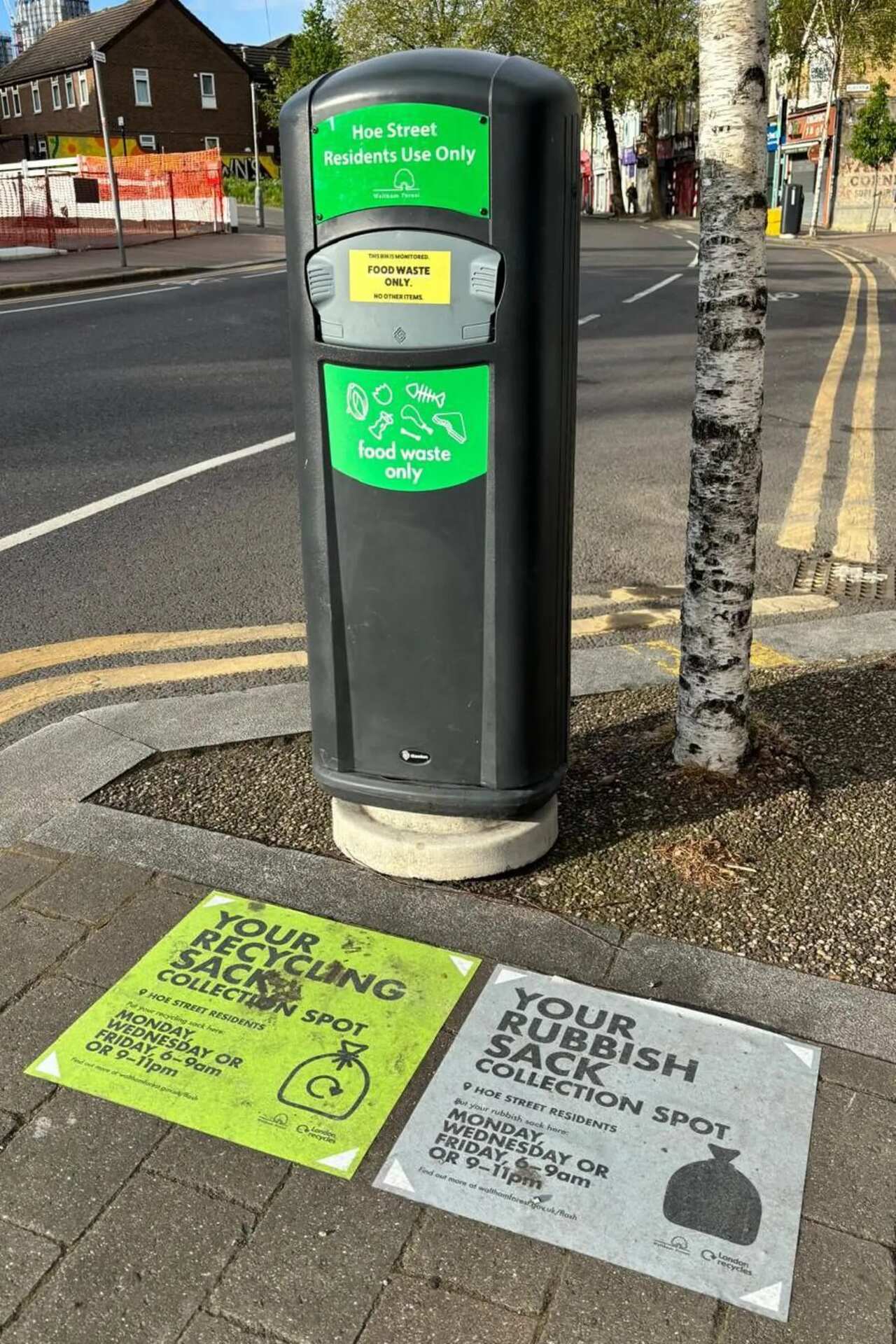Bin bags are piling up on this street - residents have had enough
BBC | 16.11.2025 08:02
Bin bags are piling up on this street - residents have had enough
Loïc Frémond loves living in London. On summer nights the sound of laughter from pubs and bars wafts through his neighbourhood - but so does the stench of rubbish.
Bin bags on pavements are a familiar sight where Mr Frémond lives - as in many cities - their contents often strewn across the street; the result of vermin clawing them as they wait to be collected.
Some of the bin bags Mr Frémond sees are his own. Eight months ago the bin room in his apartment building in Tower Hamlets was closed at the request of the local council.
Until then, residents would take their rubbish and recycling to the bin room as and when they needed to. On collection day, the concierge would put these bins on to the pavement for refuse workers to empty each week.
One day Mr Frémond, 29, came down to find the bin room locked. The concierge had been told a weekly collection was no longer a suitable arrangement.
Instead, residents were to leave their bags of rubbish on the pavement outside the building where refuse workers would collect them twice a day.
'Rubbish sits there all night'
Mr Frémond says not only is this unsightly, it attracts foxes and rats and obstructs the pavement. And to make matters worse, collections are often missed.
"The rubbish just sits on the pavement all night long - sometimes until midday the next day," he tells me. "In the summer in particular, this was an absolute nightmare - the heat causing quite a foul stench."
Tower Hamlets Council was contacted for comment.
Mr Frémond feels the bin bag-filled pavements make his neighbourhood near Spitalfields Market, a popular spot for tourists known for its food and art stalls, less pleasant for residents and visitors alike.
Other London boroughs, such as Wandsworth and Havering, don't collect wheelie bins and ask all residents to place their bin bags on the pavement or just inside the boundary of their property.
Outside London, most councils - from the New Forest to Moray - use a flexible approach like Tower Hamlets where residents use wheelie bins if their property can accommodate one - and, if not, their bin bags are collected from the pavement.
Mr Frémond heard of one person interested in moving into his building who chose not to after seeing all the rubbish in the street.
He says other residents have spoken about moving out.
"It is a frequent topic of conversation in the tenants' group chat," he says.

It's not just rubbish from homes that ends up strewn across the streets, it's waste from local businesses too.
Businesses place bin bags on pavements for collection by a variety of contracted waste firms, which they can choose from, who pick up at various times of day.
"It means that, at any given moment you walk down the street, there's a reasonable chance you're going to see piles of bin bags waiting for collection," says Nicholas Boys Smith, a former adviser to the government on urban design.
This competitive system, which Mr Boys Smith says helps keep the cost of waste disposal down, doesn't just affect people living in dense cities. Towns with historic centres and narrow streets often don't have space for large outdoor bins for businesses to place their rubbish in either - so their bin bags hit the pavement.
"[The system works] OK in areas where you've got some dedicated, pre-built rubbish collection points as part of a big new development," he says. "Where you don't have that is historic high streets and town centres."
So what can be done?
During the summer Mr Boys Smith visited Clamart in France, a suburb seven miles from Paris that was once an industrial site.
The local authority has redeveloped it into a residential area full of low-rise apartment buildings and shops - there's even a lake.
Subterranean bins have been built into the brick pavement on street corners, where residents can drop their bags into a chute above ground.
This leads to a large underground storage unit which is then emptied by specialist bin trucks that have a crane attached.
These subterranean bins are clean, smartly presented, and a better use of public space, says Mr Boys Smith. "They help avoid 'death by wheelie bin', which plagues so many British streets [on collection day]."

These kinds of bins also exist in Tower Hamlets, though not in the neighbourhood where Mr Frémond lives. In Bethnal Green, a group of apartment buildings named after heroes from Greek mythology have subterranean bins for general waste and recycling.
In 2022 authorities in Liverpool installed these kinds of bins in some neighbourhoods. Officials in Sheffield put them in the city centre earlier this year.
According to Samuel Hughes, a housing expert from the Centre for Policy Studies think tank, they are the best solution for rubbish disposal in towns and cities and more should be installed to help residents like Mr Frémond.
Mr Hughes used to live in the Italian city of Florence where subterranean bins are common and he says they are widely used in most of western Europe.
There are some challenges, though. They would need to be installed in locations such as pavements if there is space or, failing that, they could fit into parking bays.
"But obviously this creates a brouhaha because you're taking over some space that people are already using for cars," he adds.


Buying and installing subterranean bins is also expensive, compared to wheelie bins, so cash-strapped councils might not be able to afford them in large numbers.
Another obstacle is the array of cables and pipes under streets which would need to be adapted in locations where subterranean bins are installed.
Some British high streets are so busy that there aren't parking bays or space on the pavement for subterranean bins - so people living in flats above shops have no choice but to leave bin bags on pavements.
Councils have tried various methods to make this tidier, ranging from placing vinyl stickers on pavements showing where bin bags should be placed, to repurposing plastic storage containers normally made for grit or dog waste.
Businesses are trying too. Some in Putney, south-west London, have clubbed together to buy large e-bikes that are used to ferry rubbish from shopfronts to a central collection point. A bin truck then takes all the rubbish away in one go.
Mr Frémond hopes something similar might be done to improve things in his area.
"Everything is on my doorstep," he says of living there - but the bin bags on his doorstep aren't so welcome.









